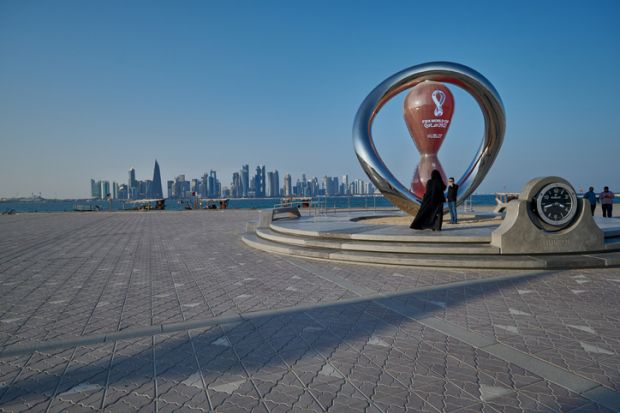Qatar-based universities have recorded “significant” increases in applications in the year since the Fifa World Cup put the Gulf state in the spotlight.
The 2022 edition of the most widely viewed sporting event in the world was seen as the “branding opportunity of a lifetime” for Qatar, and the sight of Lionel Messi lifting the trophy draped in a bisht arguably delivered that.
Education City, which is home to eight universities, hosted multiple matches during the tournament and featured prominently in advertisements.
Safwan Masri, dean of Georgetown University in Qatar, said that Education City had been a key part of the country’s strategy to “project its image on to the world stage” and that his institution had benefited as a result. Student applications have increased by 40 per cent over the past year.
“It has presented Qatar in a very positive light, in terms of admissions,” he said. “Now, is that a causal relationship or a correlation? Nobody can say, but definitely there has been much greater interest in and much greater familiarity with Qatar.”
Other institutions have reported rises in applications as high as 80 per cent, which came as a surprise even to Francisco Marmolejo, higher education president of the Qatar Foundation, the state-led organisation responsible for Education City.
“We have seen a significant increase in requests from students all across the world who want to come and study,” he said. “I think there is a significant connection to [the World Cup]. When you ask people, they say they knew about the country because of the World Cup.”
Geoff Harkness, formerly a postdoctoral teaching fellow at Northwestern and Carnegie Mellon universities’ Education City campuses, said that for the most part Qatar had looked good on television and the World Cup had gone off largely without incident. But he cautioned that the impact might not be entirely positive.
“In the short term, it may have a positive impact in terms of applications or increased enrolment, but it may also be polarising due to the negative attention wrought from the alcohol policy reversals and certain prohibitions [enforced during the World Cup],” said Dr Harkness, now associate professor of sociology at Rhode Island College.
Sarah McLaughlin, senior scholar on global expression at the Foundation for Individual Rights and Expression (Fire), acknowledged that countries with deep pockets could use events such as the World Cup to deflect attention from their human rights records.
“I don’t see any reason to believe the World Cup improved the situation on the ground for free expression in Qatar or ameliorated existing concerns about satellite campuses in the country,” she said.
Saudi Arabia, which is set to host the 2034 World Cup, has recently signalled its interest in hosting foreign branch campuses.
“If countries with significant restrictions on free expression and academic freedom are able to continue redirecting attention to more positive stories, it’s unlikely that universities will feel meaningful pressure to re-evaluate their expansion projects there,” Ms McLaughlin added.
Register to continue
Why register?
- Registration is free and only takes a moment
- Once registered, you can read 3 articles a month
- Sign up for our newsletter
Subscribe
Or subscribe for unlimited access to:
- Unlimited access to news, views, insights & reviews
- Digital editions
- Digital access to THE’s university and college rankings analysis
Already registered or a current subscriber? Login








